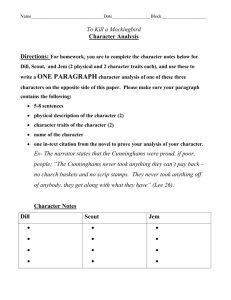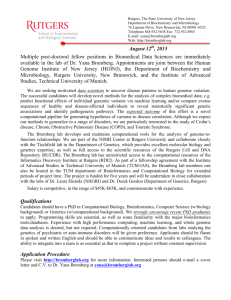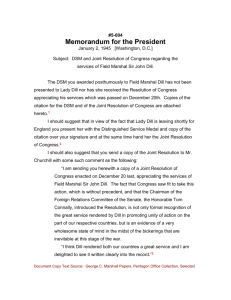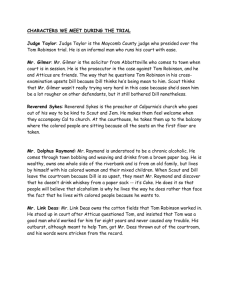Chem 558: Physical Chemistry II
advertisement
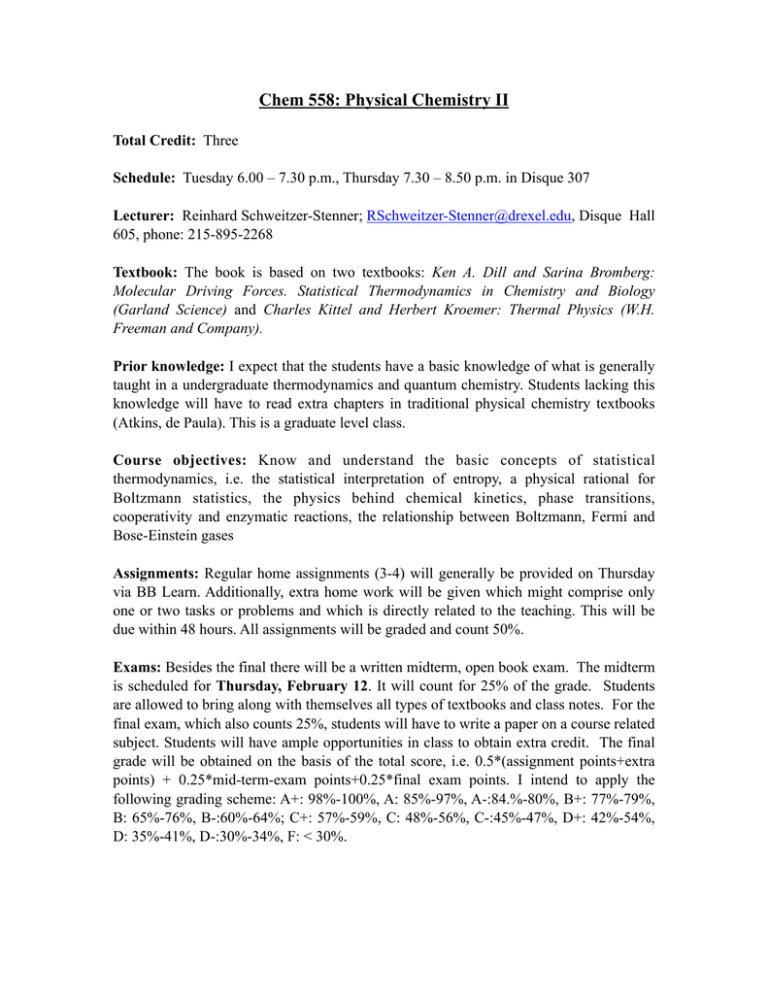
Chem 558: Physical Chemistry II Total Credit: Three Schedule: Tuesday 6.00 – 7.30 p.m., Thursday 7.30 – 8.50 p.m. in Disque 307 Lecturer: Reinhard Schweitzer-Stenner; RSchweitzer-Stenner@drexel.edu, Disque Hall 605, phone: 215-895-2268 Textbook: The book is based on two textbooks: Ken A. Dill and Sarina Bromberg: Molecular Driving Forces. Statistical Thermodynamics in Chemistry and Biology (Garland Science) and Charles Kittel and Herbert Kroemer: Thermal Physics (W.H. Freeman and Company). Prior knowledge: I expect that the students have a basic knowledge of what is generally taught in a undergraduate thermodynamics and quantum chemistry. Students lacking this knowledge will have to read extra chapters in traditional physical chemistry textbooks (Atkins, de Paula). This is a graduate level class. Course objectives: Know and understand the basic concepts of statistical thermodynamics, i.e. the statistical interpretation of entropy, a physical rational for Boltzmann statistics, the physics behind chemical kinetics, phase transitions, cooperativity and enzymatic reactions, the relationship between Boltzmann, Fermi and Bose-Einstein gases Assignments: Regular home assignments (3-4) will generally be provided on Thursday via BB Learn. Additionally, extra home work will be given which might comprise only one or two tasks or problems and which is directly related to the teaching. This will be due within 48 hours. All assignments will be graded and count 50%. Exams: Besides the final there will be a written midterm, open book exam. The midterm is scheduled for Thursday, February 12. It will count for 25% of the grade. Students are allowed to bring along with themselves all types of textbooks and class notes. For the final exam, which also counts 25%, students will have to write a paper on a course related subject. Students will have ample opportunities in class to obtain extra credit. The final grade will be obtained on the basis of the total score, i.e. 0.5*(assignment points+extra points) + 0.25*mid-term-exam points+0.25*final exam points. I intend to apply the following grading scheme: A+: 98%-100%, A: 85%-97%, A-:84.%-80%, B+: 77%-79%, B: 65%-76%, B-:60%-64%; C+: 57%-59%, C: 48%-56%, C-:45%-47%, D+: 42%-54%, D: 35%-41%, D-:30%-34%, F: < 30%. Complaints: Complaints about the grading of assignments and exams have to be brought to the attention of the lecturer within 48 hours after their return. All grades are considered final afterwards. Drop out: According to Drexel University policy, students are allowed to drop courses until the last day of the sixth week. Office hour: To comply with Drexel policy I officially offer office hours on Monday from 4.30 through 6.00 p.m. However, students are urged to see me in my office in the case of any problems and questions. Principal philosophy: The course will emphasize conceptual thinking instead of memorizing. Students shall be prepared to employ concepts introduced in class to a variety of problems. Exams will frequently contain question, which check the understanding of the subject. It is assumed that the participating students have a solid working knowledge of pre-calculus, calculus, linear algebra, complex numbers, vector analysis and elementary statistics. The lecturer will be ready to work on mathematical deficiencies, if this is necessary. In order to complete this class successfully, students have to work on the class material on a weekly basis. This includes additional reading as indicated below. Behavior in class: Students are asked to appear on time for the class and to switch off their cellular phones. Cheating will lead to an F for the entire course and to serious consequences for the student’s standing in the program. I am encouraging discussions, but not chattering while I am lecturing. Syllabus References is made to related chapters in the Dill/Bromberg textbook. However, some of the chapters go beyond the respective contents of this book. 1. Principles of probability (Week 1, Dill, Bromberg. Chapter 1) • • • • Introducing probability Correlated events Distribution functions Averages and their standard deviations 2. Chemical Equilibria (Week 2, Dill, Bromberg, Chapter 2) • Extremum principle • Definition of equilibrium • Maximizing multiplicity 3. Entropy (Week 3, Dill, Bromberg, Chapter 6; Kittel, Kroemer: Chapter 2) • Reservoir-system exchange • Electrons or ferminons in a magnetic field • Statistical definition of entropy • Principle of fair appointment 4. The statistics of canonical ensembles (Week 4 and half of week 5, Dill, Bromberg, Chapter 10 and 11, Kittel, Kroemer, Chapter 3) • Boltzmann distribution and partition function • Thermodynamic parameters and partition function • Statistical thermodynamics of atoms and molecules • Physics behind enthalpy-entropy compensation 5. The Grand Canonical Ensemble (Half of week 5 and week 6, Dill, Bromberg, Chapter 28) • Particle exchange • Grand partition sum • Grand potential • Ligand binding to myoglobin Midterm exam on February 12 6. Gases and solids (Week 7 and 8, Dill, Bromberg, Chapter 11; Kittel, Kroemer, Chapter 6 and 7) • Partition sum of molecules • Fermi-Dirac distribution • Bose-Einstein distribution • Ideal gas and particle in the box • Einstein and Debye model of solids 7. Cooperativity (Week 9 and 10, Dill, Bromberg, chapter 26 and 28) • Landau model • Helix-coil transitions • Ising model • Kinetics of Phase transitions 8. Kinetics (Week 11, Dill, Bromberg, Chapters 18 and 19) • Flow and diffusion • Diffusion and friction • Fluctuation and Dissipation • Reaction rates • Transition state theory • Activated process 9. Polymer solutions (Dill, Bromberg) (only, if time is left) • Distributions of Conformations • Flory-Huggins model • Non-ideal properties • Phase behavior • Flory theorem

